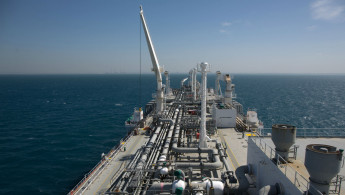$15 billion deal to allow Israeli gas exports to Egypt
A US-Israeli consortium leading the development of Israel's offshore gas reserves announced on Thursday a deal that would enable the export of natural gas to Egypt.
Noble Energy and its Israeli partner Delek, along with Egyptian East Gas Company, bought 39 percent of a disused pipeline connecting the Israeli coastal city of Ashkelon with the northern Sinai peninsula.
The consortium paid $518 million for the interest in the East Mediterranean Gas Company pipeline.
The mainly undersea pipeline will be used to transport natural gas from the Tamar and Leviathan reservoirs to Egypt from as early as 2019, allowing a 10-year $15 billion deal signed in February with Egypt's Dolphinus to move forward, Delek said in a statement.
It will be the first time Egypt, which in 1979 became the first Arab country to sign a peace treaty with Israel, imports gas from its neighbour.
Israel had bought gas from Egypt but land sections of the pipeline were repeatedly targeted by Sinai jihadists in 2011 and 2012, and soaring demand meant Egypt could use the gas domestically.
Delek chief executive Yossi Abu called the pipeline purchase "the most significant milestone for the Israeli gas market since the discoveries" of the reservoirs.
"The Leviathan reservoir is becoming the Mediterranean basin's primary energy anchor, with customers in Israel, Egypt and Jordan," he said.
In September 2016, Jordan struck a deal to buy 300 million cubic feet (8.5 million cubic metres) of Israeli gas per day over 15 years, an agreement estimated to be worth $10 billion.
Tamar, which began production in 2013, has estimated reserves of up to 238 billion cubic metres (8.4 trillion cubic feet).
Leviathan, discovered in 2010 and set to begin production in 2019, is estimated to hold 535 billion cubic metres (18.9 trillion cubic feet) of natural gas, along with 34.1 million barrels of condensate.
Exports from Tamar to Jordan began on a small scale last year.
They are set to increase significantly at the end of 2019, when a new pipeline connecting Leviathan and Jordan is due to be completed.
Jordan is the only Arab country besides Egypt to have a peace deal with Israel, signed in 1994.
Energy Minister Yuval Steinitz told Israeli public radio that acquisition of the Mediterranean pipeline to Egypt, alongside exports to Jordan, "connects the peace axis states with the shared regional gas infrastructure."
Israel has limited natural resources but in the past few years it has discovered major gas fields off its coast and is building the infrastructure needed to tap them.
Israel hopes its gas reserves will give the country energy independence and the prospect of becoming a supplier for Europe as well as forging strategic ties within the region.
Last week, Cyprus, whose offshore reserves border those of Israel, signed a deal paving the way for construction of an undersea pipeline to liquefied natural gas facilities in Egypt to enable production to be re-exported to Europe.
Normalisation
The deal comes at a time of increasing normalisation between Arab states and Israel.
In August, Israel's Prime Minister Binyamin Netanyahu said "many Arab countries now see Israel not as their enemy but as their indispensable ally in pushing back Iranian aggression.
Israel has peace treaties with just two Arab countries, Egypt and Jordan, while others insist on an agreement with the Palestinians as a prerequisite that would pave the way to formal relations.
Earlier this year Saudi Arabian King Salman reaffirmed "steadfast" support for the Palestinian cause after Crown Prince Mohammed bin Salman signalled a shift in the country's approach.
Prince Mohammed in April said in a magazine interview that Israelis, as well as Palestinians, "have the right to have their own land".
Both Israel and Saudi Arabia have opposed the Iran nuclear deal and pushed for tougher action against Iran's spreading influence in the Middle East.
In July, the Saudis slammed a controversial Israeli law as "perpetuating racial discrimination" against Palestinians by defining the country as the nation-state of the Jewish people.
Arab citizens account for some 17.5 percent of Israel's more than eight million population and have long complained of discrimination.
The Israeli legislation was also condemned by the six-nation Gulf Cooperation Council, comprised of Saudi Arabia, Bahrain, Kuwait, Oman, Qatar and the United Arab Emirates.”
Agencies contributed to this report.
Follow us on Twitter: @The_NewArab





 Follow the Middle East's top stories in English at The New Arab on Google News
Follow the Middle East's top stories in English at The New Arab on Google News

![Israeli forces ordered bombed Gaza's Jabalia, ordering residents to leave [Getty]](/sites/default/files/styles/image_330x185/public/2176418030.jpeg?h=a5f2f23a&itok=_YGZaP1z)
